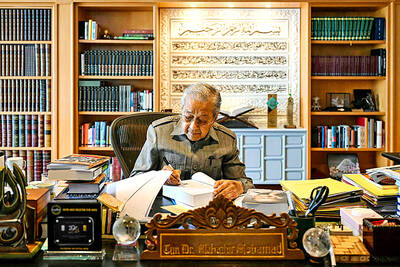China’s crackdown on critics and ethnic minorities, amid reversals in the rule of law since 2008, warrants redoubled US efforts to press Beijing on human rights, experts told a congressional panel on Tuesday.
In testimony to the Congressional-Executive Commission on China, human rights and legal experts said Washington had played down human rights as it sought Beijing’s help with the global financial crisis and diplomatic crises with North Korea and Iran.
The vague and catch-all charge of “endangering state security” has been applied to a series of cases involving writers and lawyers as well as ethnic minorities from Tibet and Xinjiang, regions roiled by violent protests in 2008 and last year.
“Roughly since the beginning of 2008, there has been a palpable sense that earlier progress towards rule of law in China has stalled, or even suffered a reversal,” researcher Joshua Rosenzweig of the Dui Hua Foundation said.
“There is mounting evidence that a crackdown is under way, one particularly targeting members of ethnic minorities, government critics and rights defenders,” he told the panel.
The Dui Hua Foundation, which works to win medical parole or early release for political prisoners, has compiled a list of 5,800 people imprisoned in China for nonviolent expression of religious and political beliefs, Rosenzweig said.

A new online voting system aimed at boosting turnout among the Philippines’ millions of overseas workers ahead of Monday’s mid-term elections has been marked by confusion and fears of disenfranchisement. Thousands of overseas Filipino workers have already cast their ballots in the race dominated by a bitter feud between President Ferdinand Marcos Jr and his impeached vice president, Sara Duterte. While official turnout figures are not yet publicly available, data from the Philippine Commission on Elections (COMELEC) showed that at least 134,000 of the 1.22 million registered overseas voters have signed up for the new online system, which opened on April 13. However,

ALLIES: Calling Putin his ‘old friend,’ Xi said Beijing stood alongside Russia ‘in the face of the international counter-current of unilateralism and hegemonic bullying’ Chinese President Xi Jinping (習近平) yesterday was in Moscow for a state visit ahead of the Kremlin’s grand Victory Day celebrations, as Ukraine accused Russia’s army of launching air strikes just hours into a supposed truce. More than 20 foreign leaders were in Russia to attend a vast military parade today marking 80 years since the defeat of Nazi Germany in World War II, taking place three years into Russia’s offensive in Ukraine. Putin ordered troops into Ukraine in February 2022 and has marshaled the memory of Soviet victory against Nazi Germany to justify his campaign and rally society behind the offensive,

CONFLICTING REPORTS: Beijing said it was ‘not familiar with the matter’ when asked if Chinese jets were used in the conflict, after Pakistan’s foreign minister said they were The Pakistan Army yesterday said it shot down 25 Indian drones, a day after the worst violence between the nuclear-armed rivals in two decades. Pakistani Prime Minister Shehbaz Sharif vowed to retaliate after India launched deadly missile strikes on Wednesday morning, escalating days of gunfire along their border. At least 45 deaths were reported from both sides following Wednesday’s violence, including children. Pakistan’s military said in a statement yesterday that it had “so far shot down 25 Israeli-made Harop drones” at multiple location across the country. “Last night, India showed another act of aggression by sending drones to multiple locations,” Pakistan military spokesman Ahmed

Former Malaysian prime minister Mahathir Mohamad is giving US President Donald Trump three months before his fellow Americans force him to rethink his stringent global tariff strategy, accusing the US leader of “living in an old world.” In an interview two months ahead of his 100th birthday, the plain-speaking Mahathir said: “Trump will find that his tariffs are hurting America, and the people in America will end up against him.” The US president’s stop-start tariff rollout would impact Asian nations hard, including Malaysia, which faces a 24 percent levy in July unless the two countries can strike a deal. “It’s going to cause